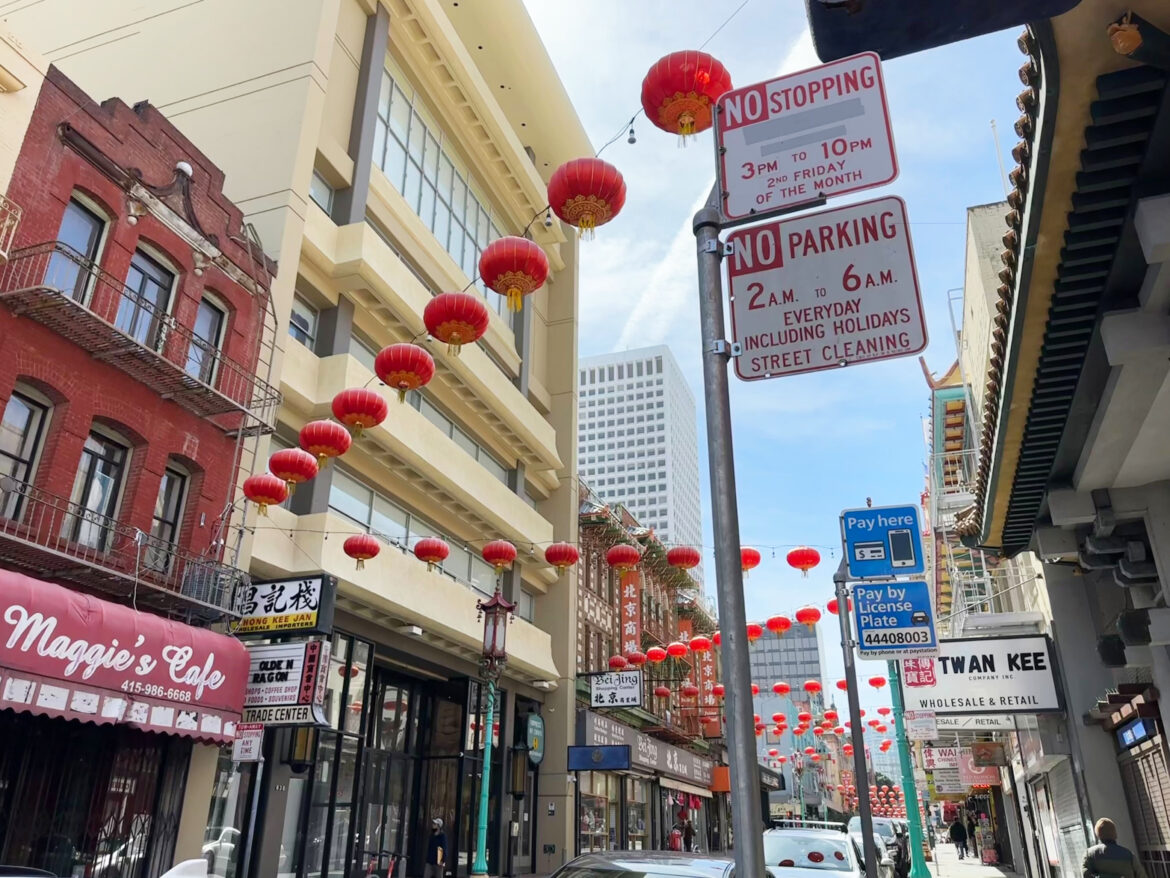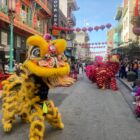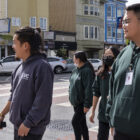Groups in San Francisco’s Chinatown are battling over whether to use a section of a vital tourist artery for expanded recurring events, intended to help the area recover from the pandemic.
The dispute, which the city’s Board of Appeals is set to weigh in on Wednesday, is the latest skirmish over the purpose of Grant Avenue, once filled with throngs of daily visitors, and how it should serve the neighborhood’s commerce and culture.
“We’re not a theme park,” said Ben Marcus-Willers, branding director for Red Blossom Tea Company and one of a handful of people opposing the potential expansion of outdoor events. Other closures of Grant Avenue for events have disrupted the flow of customers to the shop, he said.
Supervisor Aaron Peskin, who represents the district and is running for mayor, is trying to help settle the dispute before the Wednesday hearing.
[ Read also: “New Parade Dragon Carries on Local Legacy Dating Back Nearly 175 Years” ]
Since the start of the pandemic, Chinatown groups have closed pockets of the neighborhood to vehicle traffic, making space for events that might draw people. As the closures increased over time, local merchants began to bristle. Those frustrations boiled over this March in response to the latest attempt, by a dance company, to potentially expand events. A group of merchants had the Board of Appeals intervene, temporarily halting the expansion. The two sides then set up dueling online petitions, both trying to garner public support.
By April 12, the merchants’ petition, on the website change.org, had 1,453 signatures. The competing petition had 1,626 signatures.
Neighborhood mixed on outdoor performances
Chinatown’s denizens have mixed opinions about the recurring street closures and the events they enable.
Norman Lau is a Chinatown native and the founder of LionDanceME, the dance company whose application for an amplified-sound permit sparked the current conflict over Grant Avenue. For years, Lau’s company has used the street for weekend lion dances, in which costumed performers mimic a lion’s movements.
Lau said he believes that hosting dance practices and performances on the neighborhood’s busiest street has helped attract not only tourists, but also young people who had grown up there and later moved away.
Members of younger generations seldom have a reason to return unless their families own shops, Lau observed. “We don’t really have anything to offer for people in their 20s and 30s,” he said.
Some nearby merchants agree. They said the performances increase the area’s gravitational pull as a cultural hub for Chinese Americans.
“Just last week, one of my customers drove two hours from Sacramento with his family to see the lion dance in Chinatown,” said Wendy Li, who has worked on Grant Avenue for over a decade.
However, for Chinatown residents like 89-year-old cartoonist Xu Shu Lei, who lives in a small room on Grant Avenue with his wife, the constant drumming sound during performances can be frustrating. It often wakes him from his afternoon naps.
“At this age, I don’t get a lot of sleep at night,” Lei said.
“We all support lion dancing and youth engagement,” said David Au, one of the local merchants who triggered the Board of Appeals’ intervention. But Au said he would like to see at least some of those dance practices and events occur elsewhere in Chinatown, outside of Grant Avenue. He also suggested that local groups could offer other forms of youth engagement, like more after-school programs at the Chinatown YMCA.
Cherry Cai, who runs a gift store on the street, echoed that idea. She said the lion dance performance benefited her business and suggested that it could be rotated among different locations.
Uptick in events irks some
Outdoor events in Chinatown began ramping up soon after COVID-19 struck a blow to tourism in San Francisco. Neighborhood groups obtained permits through the city’s Shared Spaces program to close a section of Grant Avenue to car traffic on weekends. The site became home to cultural performances and outdoor businesses that drew pedestrians.
The weekend closures were extended after COVID restrictions lifted. Over time, additional groups got permits to close the street for events.
Some local merchants and residents began objecting to closures. They said that some event organizers were not consulting the community enough before getting permits for events, which were reducing parking for residents, customers and vehicles unloading merchandise, and resulting in more unsightly trash on the streets. The merchants were concerned that increasing closures would further hurt their businesses.
“Eventually, all these permits are merging together,” Marcus-Willers said. “At a certain point, we are going to lose complete access to our street if this trend continues.”
Merchants group slams the brakes
In 2022, LionDanceME took over a pre-existing permit to close three blocks of Grant Avenue, and the company has renewed it annually ever since. On weekends, the group generally used one block for lion dancing.
Following the most recent permit renewal, the San Francisco Municipal Transportation Agency installed a street sign this March prohibiting cars from stopping along the three-block stretch without prior notice on any weekend.
Merchants were surprised and bothered that the affected area would expand. “A metal sign means that this is no longer temporary, it’s permanent now,” said merchant Au. He is one of the merchants who first spotted the sign.
They met with Lau and transit agency representatives and expressed their concerns. Lau agreed to limit dancing to one day per weekend, and only on one block, and city staff covered the sign so that drivers could stop along the street again. But less than a week later, the merchants discovered that Lau had gotten yet another permit, this time for amplified sound at the dance performances — and for full weekends.
The merchants saw this as a breach of their agreement and got the Board of Appeals to temporarily put a hold on the permit.
If the two groups fail to reach a compromise before the Board of Appeals hearing next week, the Board will decide whether to revoke the permit.
Editor’s note (4/16/2024): An earlier version of this story named the wrong person as the author of the merchants’ online petition, and incorrectly described a type of event that company LionDanceME participated in. That information has been removed.










